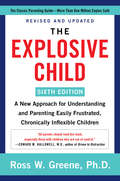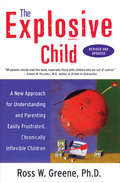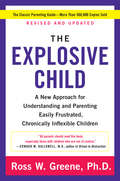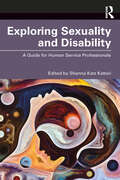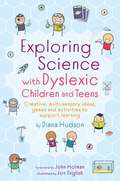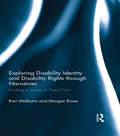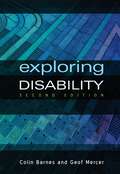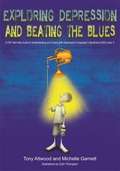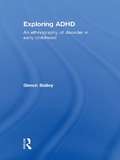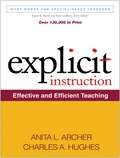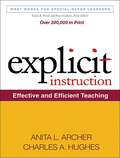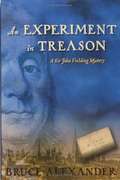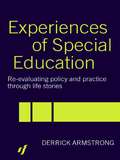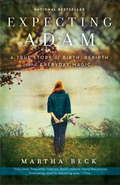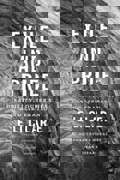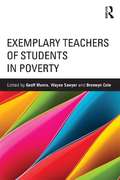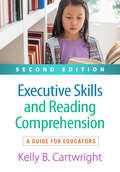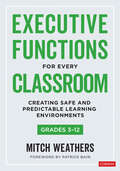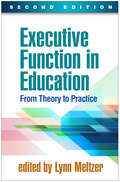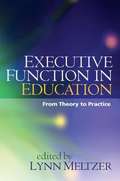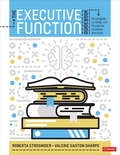- Table View
- List View
The Explosive Child [Sixth Edition]: A New Approach for Understanding and Parenting Easily Frustrated, Chronically Inflexible Children
by Ross W Greene PhDNow in a revised and updated 6th edition, the groundbreaking, research-based approach to understanding and parenting children who frequently exhibit severe fits of temper and other challenging behaviors, from a distinguished clinician and pioneer in the field.What’s an explosive child? A child who responds to routine problems with extreme frustration—crying, screaming, swearing, kicking, hitting, biting, spitting, destroying property, and worse. A child whose frequent, severe outbursts leave his or her parents feeling frustrated, scared, worried, and desperate for help. Most of these parents have tried everything-reasoning, explaining, punishing, sticker charts, therapy, medication—but to no avail. They can’t figure out why their child acts the way he or she does; they wonder why the strategies that work for other kids don’t work for theirs; and they don’t know what to do instead.Dr. Ross Greene, a distinguished clinician and pioneer in the treatment of kids with social, emotional, and behavioral challenges, has worked with thousands of explosive children, and he has good news: these kids aren’t attention-seeking, manipulative, or unmotivated, and their parents aren’t passive, permissive pushovers. Rather, explosive kids are lacking some crucial skills in the domains of flexibility/adaptability, frustration tolerance, and problem solving, and they require a different approach to parenting. Throughout this compassionate, insightful, and practical book, Dr. Greene provides a new conceptual framework for understanding their difficulties, based on research in the neurosciences. He explains why traditional parenting and treatment often don’t work with these children, and he describes what to do instead. Instead of relying on rewarding and punishing, Dr. Greene’s Collaborative Problem Solving model promotes working with explosive children to solve the problems that precipitate explosive episodes, and teaching these kids the skills they lack.
The Explosive Child: A New Approach for Understanding and Parenting Easily Frustrated, "Chronically Inflexible" Children
by Ross W. GreeneWhat's an explosive child? A child who responds to routine problems with extreme frustration-crying, screaming, swearing, kicking, hitting, biting, spitting, destroying property, and worse. A child whose frequent, severe outbursts leave his or her parents feeling frustrated, scared, worried, and desperate for help. Most of these parents have tried everything--reasoning, explaining, punishing, sticker charts, therapy, medication-- but to no avail. They can't figure out why their child acts the way he or she does; they wonder why the strategies that work for other kids don't work for theirs; and they don't know what to do instead. Dr. Ross Greene, a distinguished clinician and pioneer in the treatment of kids with social, emotional, and behavioral challenges, has worked with thousands of explosive children, and he has good news: these kids aren't attention-seeking, manipulative, or unmotivated, and their parents aren't passive, permissive pushovers. Rather, explosive kids are lacking some crucial skills in the domains of flexibility/adaptability, frustration tolerance, and problem solving, and they require a different approach to parenting. Throughout this compassionate, insightful, and practical book, Dr. Greene provides a new conceptual framework for understanding their difficulties, based on research in the neurosciences. He explains why traditional parenting and treatment often don't work with these children, and he describes what to do instead. Instead of relying on rewarding and punishing, Dr. Greene's Collaborative Problem Solving model promotes working with explosive children to solve the problems that precipitate explosive episodes, and teaching these kids the skills they lack.
The Explosive Child
by Ross W. GreeneScreaming, swearing, crying, hitting, kicking, spitting, biting...these are some of the challenging behaviors we see in kids who are having difficulty meeting our expectations. These behaviors often leave parents feeling frustrated, angry, overwhelmed, and desperate for answers. In this fully revised and updated book, Dr. Ross Greene helps you understand why and when your child does these things and how to respond in ways that are nonpunitive, nonadversarial, humane, and effective.Dr. Greene describes how best to: Understand the factors that contribute to challenging episodes. Identify the specific situations in which challenging episodes are likely to occur. Reduce or eliminate challenging episodes by solving the problems that cause them. Solve problems collaboratively (rather than unilaterally) and proactively (rather than reactively). Help your child develop the skills to be more flexible, solve problems, and handle frustration more adaptively. Reduce hostility and antagonism between you and your child.With Dr. Greene's practical, expert guidance, you and your child will forge a new relationship based on communication and mutual respect.
The Explosive Child
by Ross W. GreeneWhat's an explosive child? A child who responds to routine problems with extreme frustration-crying, screaming, swearing, kicking, hitting, biting, spitting, destroying property, and worse. A child whose frequent, severe outbursts leave his or her parents feeling frustrated, scared, worried, and desperate for help. Most of these parents have tried everything-reasoning, explaining, punishing, sticker charts, therapy, medication-but to no avail. They can't figure out why their child acts the way he or she does; they wonder why the strategies that work for other kids don't work for theirs; and they don't know what to do instead. Dr. Ross Greene, a distinguished clinician and pioneer in the treatment of kids with social, emotional, and behavioral challenges, has worked with thousands of explosive children, and he has good news: these kids aren't attention-seeking, manipulative, or unmotivated, and their parents aren't passive, permissive pushovers. Rather, explosive kids are lacking some crucial skills in the domains of flexibility/adaptability, frustration tolerance, and problem solving, and they require a different approach to parenting. Throughout this compassionate, insightful, and practical book, Dr. Greene provides a new conceptual framework for understanding their difficulties, based on research in the neurosciences. He explains why traditional parenting and treatment often don't work with these children, and he describes what to do instead. Instead of relying on rewarding and punishing, Dr. Greene's Collaborative Problem Solving model promotes working with explosive children to solve the problems that precipitate explosive episodes, and teaching these kids the skills they lack.
Exploring Sexuality and Disability: A Guide for Human Service Professionals
by Shanna Katz KattariOffering a current, comprehensive, and intersectional guide for students, practitioners, and researchers, this book synthesizes existing scholarship on culturally responsive practices that assist in exploring, understanding, and affirming the sexuality(ies) of disabled, chronically ill, neurodivergent, and Mad individuals. Drawing on an intersectional framework, it integrates insights drawn from an interdisciplinary body of scholarship including psychology, social work, sociology, history, political science, women and gender studies, cultural studies, and education along with perspectives from the practitioners who are actively defining the next generation of best practices. By highlighting the incredible resilience and resistance of disabled individuals’ and communities’ sexuality and sexual well-being, this book challenges narratives that rely primarily on a one-dimensional view derived from the medical model and the view of disability as something to be “fixed” – or at least tolerated – rather than celebrated. In a world that pathologizes and devalues the sexual existence of disabled individuals, it illustrates how to create thriving communities and relationships, and how they can organize to find their voice, providing a counter-narrative of empowerment that fosters hopefulness, power, and health. It will be of interest to all scholars, students, and professionals across a variety of professions, including social work, psychology, counseling, policy, healthcare, education, community organizing, and multiple social service settings.
Exploring Science with Dyslexic Children and Teens: Creative, multi-sensory ideas, games and activities to support learning
by Diana HudsonThis book is a collection of ideas, activities and approaches for science learning, to support kids with learning differences aged 9+ to grow in confidence, recall and understanding. The multi-sensory and fun ideas and activities can be adapted to suit individual students' needs and skills, and curriculum stage. Written by an experienced science teacher, the book includes mnemonics, art, drama and poetry activities, board games, card games, and more. All of these strategies will aid neurodiverse students' science learning and memory through boosting their creative thinking, encouraging a play-based and exploratory approach to science. Whether you want to get creative, play a game or try out a fun experiment, you can dip in and out of the activities to suit your student's unique learning style. The activities in the book will help creative thinkers who learn differently to take alternative approaches to tricky topics, grasping a fundamental understanding of key scientific concepts, whilst gaining confidence as the scientists of tomorrow.
Exploring Disability Identity and Disability Rights through Narratives: Finding a Voice of Their Own
by Ravi Malhotra Morgan RoweBuilding on David M. Engel and Frank W. Munger’s work analyzing the narratives of people with physical and learning disabilities, this book examines the life stories of twelve physically disabled Canadian adults through the prism of the social model of disablement. Using a grounded theory approach and with extensive reporting of the thoughts of the participants in their own words, the book uses narratives to explore whether an advocacy identity helps or hinders dealings with systemic barriers for disabled people in education, employment, and transportation.<P><P> The book underscores how both physical and attitudinal barriers by educators, employers and service providers complicate the lives of disabled people. The book places a particular focus on the importance of political economy and the changes to the labour market for understanding the marginalization and oppression of people with disabilities. By melding socio-legal approaches with insights from feminist, critical race, and queer legal theory, Ravi Malhotra and Morgan Rowe ask if we need to reconsider the social model of disablement, and proposes avenues for inclusive legal reform.
Exploring Disability: A Sociological Introduction (2nd edition)
by Colin Barnes Geof MercerThe second edition of this book has been carefully rewritten to ensure that it is up-to-date with cutting edge debates, evidence, and policy changes and is indispensable for students across the social sciences, and in health and social care, who really want to understand the issues facing disabled people and disabling societies.
Exploring Depression, and Beating the Blues: A CBT Self-Help Guide to Understanding and Coping with Depression in Asperger’s Syndrome [ASD-Level 1]
by Tony Attwood Michelle Garnett Colin ThompsonFor people with ASDs, depression is common, and has particular features and causes. This outstanding book provides a comprehensive review of these aspects, and an effective self-help guide for anyone with an autism spectrum disorder (ASD) affected by depression. Written by the leading experts in the field, the book explains and describes depression, the forms it can take, and how it looks and feels for a person on the autism spectrum. The authors draw on the latest thinking and research to suggest strategies for coping with the effects of depression and provide a complete step-by-step CBT self-help programme, designed specifically for individuals with ASDs. The programme helps increase self-awareness, including identifying personal triggers, and provides the tools to combat depression.
Exploring ADHD: An ethnography of disorder in early childhood
by Simon BaileyAttention Deficit Hyperactivity Disorder (ADHD) is the most commonly diagnosed psychiatric condition of childhood worldwide, yet the medical and psychological perspectives that dominate our understandings of ADHD present problems in their reductive understanding of the condition. Exploring ADHD incorporates Michel Foucault’s notions of discourse and power into a critical ethnographic framework in order to analyse ADHD in terms of both the historical conditions that have shaped understandings of the disorder, and also the social conditions which build individual diagnostic cases in today’s schools and families. In this ground-breaking text, Simon Bailey also: acknowledges the necessary work of classrooms, schools and families in contributing to a social order; examines the problem of teacher autonomy and the constraints placed on schools to ‘perform’; describes the role of nurture groups in governing the emotional conduct of children; presents a unique gender analysis of ADHD. This fascinating new book will be of interest to researchers and academics in the field of early childhood education, special and inclusive education, and will illuminate and spark new debate in the arena of ADHD.
Explicit Instruction: Effective and Efficient Teaching
by Anita L. Archer Charles A. HughesExplicit instruction is systematic, direct, engaging, and success oriented--and has been shown to promote achievement for all students. This highly practical and accessible resource gives special and general education teachers the tools to implement explicit instruction in any grade level or content area. The authors are leading experts who provide clear guidelines for identifying key concepts, skills, and routines to teach; designing and delivering effective lessons; and giving students opportunities to practice and master new material. Sample lesson plans, lively examples, and reproducible checklists and teacher worksheets enhance the utility of the volume.
Explicit Instruction: Effective and Efficient Teaching (What Works for Special-Needs Learners)
by Anita L. Archer Charles A. HughesExplicit instruction is systematic, direct, engaging, and success oriented--and has been shown to promote achievement for all students. This highly practical and accessible resource gives special and general education teachers the tools to implement explicit instruction in any grade level or content area. The authors are leading experts who provide clear guidelines for identifying key concepts, skills, and routines to teach; designing and delivering effective lessons; and giving students opportunities to practice and master new material. Sample lesson plans, lively examples, and reproducible checklists and teacher worksheets enhance the utility of the volume. Purchasers can also download and print the reproducible materials for repeated use. Video clips demonstrating the approach in real classrooms are available at the authors' website: www.explicitinstruction.org. See also related DVDs from Anita Archer: Golden Principles of Explicit Instruction; Active Participation: Getting Them All Engaged, Elementary Level; and Active Participation: Getting Them All Engaged, Secondary Level
Expert Perspectives on Interventions for Reading
by International Dyslexia AssociationInformation about dyslexia.
An Experiment in Treason (Sir John Fielding Mystery #9)
by Bruce AlexanderA packet of incendiary letters is stolen from the London residence of a prominent official, and turns up in the colony of Massachusetts. Why are the contents of the letters so controversial? Why has a suspect in the theft turned up dead? And what should magistrate Sir John Fielding do about his feeling that Benjamin Franklin is somehow complicit? While the tensions rise, Sir John and his protégé, Jeremy Proctor, search for answers—and find that justice isn’t always served by the letter of the law.
Experiences of Special Education: Re-evaluating Policy and Practice through Life Stories
by Derrick ArmstrongDiscussion about educational provision for children with learning difficulties has largely ignored the voices of those for whom that provision is intended. Experiences of Special Education argues that these 'insider perspectives' are of central importance for a fuller understanding of special educational needs policy.Bringing a unique focus to the subject of special needs education, Derrick Armstrong reassesses the history of special educational policy through the life-stories of those who have first-hand experience. These stories contest official policy discourses and inform an understanding of the competing political and professional debates in this area, allowing the reader to:* Investigate the social and historical contexts of special educational needs policy* Challenge traditional notions of policy research* Explore alternative policy discourses informed by the voices of the excluded.This thought-provoking book is based on detailed case-study analysis of the experiences of over thirty adults who attended special institutions/schools between 1994 and the present. It provides a fresh perspective on current discussions of special educational provisions for teachers, student teachers, policy makers and academics, involved in special education.
Expecting Adam
by Martha Beck"He says you'll never be hurt as much by being open as you have been by remaining closed."The messenger is a school janitor with a master's in art history who claims to be channeling "from both sides of the veil." "He" is Adam, a three-year-old who has never spoken an intelligible word. And the message is intended for Martha Beck, Adam's mother, who doesn't know whether to make a mad dash for the door to escape a raving lunatic (after all, how many conversations like this one can you have before you stop getting dinner party invitations and start pushing a mop yourself?) or accept another in a series of life lessons from an impeccable but mysterious source.From the moment Martha and her husband, John, accidentally conceived their second child, all hell broke loose. They were a couple obsessed with success. After years of matching IQs and test scores with less driven peers, they had two Harvard degrees apiece and were gunning for more. They'd plotted out a future in the most vaunted ivory tower of academe. But the dream had begun to disintegrate. Then, when their unborn son, Adam, was diagnosed with Down syndrome, doctors, advisers, and friends in the Harvard community warned them that if they decided to keep the baby, they would lose all hope of achieving their carefully crafted goals. Fortunately, that's exactly what happened.Expecting Adam is a poignant, challenging, and achingly funny chronicle of the extraordinary nine months of Martha's pregnancy. By the time Adam was born, Martha and John were propelled into a world in which they were forced to redefine everything of value to them, put all their faith in miracles, and trust that they could fly without a net. And it worked.Martha's riveting, beautifully written memoir captures the abject terror and exhilarating freedom of facing impending parentdom, being forced to question one's deepest beliefs, and rewriting life's rules. It is an unforgettable celebration of the everyday magic that connects human souls to each other.From the Hardcover edition.
Exile and Pride: Disability, Queerness, and Liberation
by Eli ClareFirst published in 1999, the groundbreaking Exile and Pride is essential to the history and future of disability politics. Eli Clare's revelatory writing about his experiences as a white disabled genderqueer activist/writer established him as one of the leading writers on the intersections of queerness and disability and permanently changed the landscape of disability politics and queer liberation. With a poet's devotion to truth and an activist's demand for justice, Clare deftly unspools the multiple histories from which our ever-evolving sense of self unfolds. <P><P>His essays weave together memoir, history, and political thinking to explore meanings and experiences of home: home as place, community, bodies, identity, and activism. Here readers will find an intersectional framework for understanding how we actually live with the daily hydraulics of oppression, power, and resistance. At the root of Clare's exploration of environmental destruction and capitalism, sexuality and institutional violence, gender and the body politic, is a call for social justice movements that are truly accessible to everyone. With heart and hammer, Exile and Pride pries open a window onto a world where our whole selves, in all their complexity, can be realized, loved, and embraced.
Exile And Pride: Disability, Queerness and Liberation
by Eli ClareExile and Pride is a call to awareness, an exhortation for each of us to examine our connection to and alienation from our environment, our sexuality, and each other.
Exemplary Teachers of Students in Poverty
by Geoff Munns Wayne Sawyer Bronwyn ColeEducation and poverty exist in a highly contested relationship even in the developed world. On the one hand, educational outcomes seem solidly attached to socio-economic status, and on the other, education is often cited as a way out of poverty. Success at de-coupling poverty from educational outcomes varies across the developed world. The issues connecting education and poverty are complex, but the question of the successful engagement of students from poor backgrounds involves a complex mix of public policy on poverty, public policy on education, and teacher action. This book focuses on a number of exemplary teachers who demonstrate a set of common pedagogical qualities, assisting them to work productively with persistent classroom challenges in low SES classrooms. Exemplary Teachers of Students in Poverty shares successful classroom practice from schools serving diverse and disadvantaged communities, and stresses that opportunities in school can influence educational engagement and encourage students to achieve. The text locates itself in international debates about education and poverty, and reports on the Teachers for a Fair Go project - an Australian research project into the work of a number of teachers who were successful at engaging students from poor backgrounds. Included in the book: teaching in low SES communities what exemplary teachers of students in low SES communities do specific pedagogical approaches in literacy, ICT, creativity and culturally responsive practices students’ voices professional qualities of these teachers Exemplary Teachers of Students in Poverty will greatly benefit researchers, teacher educators and trainee teachers, allowing them to gain a much deeper understanding of the issues, constraints and perspectives in teaching contexts across low SES communities.
Executive Skills and Reading Comprehension: A Guide for Educators
by Kelly B. CartwrightThis pioneering book is now in a revised and expanded second edition featuring the latest neuroscientific knowledge and instructional strategies. Kelly B. Cartwright provides a teacher-friendly explanation of executive skills--such as planning, organization, cognitive flexibility, and impulse control--and their role in reading comprehension. Detailed examples illustrate how each skill is deployed by strong comprehenders and ways to tailor instruction for students who are struggling. The companion website features reproducible planning and assessment forms from the book as well as supplemental card sorts to teach and assess cognitive flexibility, all ready to download and print in a convenient 8 1/2" x 11" size. New to This Edition *Updated throughout with advances in theory, research, and instruction. *Chapter on word recognition, with particular attention to dyslexia. *Information on the development of the brain's reading network. *Expanded emphasis on oral language comprehension. *Appendix of intervention studies; online-only supplement with card sorts to teach and assess cognitive flexibility.
Executive Functions for Every Classroom, Grades 3-12: Creating Safe and Predictable Learning Environments
by Mitch WeathersEvery educator wants to know: What has the greatest impact on student success? The answer: executive function skills. They are crucial for students′ academic success and personal growth, yet many of our students lack the skills required to engage in learning, such as organization, planning, time management, and self-regulation. This book shows how educators can create a more engaging and effective learning experience while addressing the epidemic of disengagement and executive dysfunction. With practical guidance to make the skills "stick" for students, this vital resource also provides The three keys to teaching executive functions: Clarity, Modeling, and Routine An explanation of the specific executive functioning skills essential for student success Strategies for students to practice executive functions within the context of what they are learning Practical guidance for establishing a consistent and safe learning environment Guidance on how to expose all students to this universal MTSS/RTI Tier 1 intervention Educators can empower students to take more risks, improve their academic performance, and prepare them for the future with the help of this innovative resource.
Executive Functions for Every Classroom, Grades 3-12: Creating Safe and Predictable Learning Environments
by Mitch WeathersEvery educator wants to know: What has the greatest impact on student success? The answer: executive function skills. They are crucial for students′ academic success and personal growth, yet many of our students lack the skills required to engage in learning, such as organization, planning, time management, and self-regulation. This book shows how educators can create a more engaging and effective learning experience while addressing the epidemic of disengagement and executive dysfunction. With practical guidance to make the skills "stick" for students, this vital resource also provides The three keys to teaching executive functions: Clarity, Modeling, and Routine An explanation of the specific executive functioning skills essential for student success Strategies for students to practice executive functions within the context of what they are learning Practical guidance for establishing a consistent and safe learning environment Guidance on how to expose all students to this universal MTSS/RTI Tier 1 intervention Educators can empower students to take more risks, improve their academic performance, and prepare them for the future with the help of this innovative resource.
Executive Function in Education, Second Edition: From Theory to Practice
by Lynn MeltzerThis groundbreaking volume, now revised and updated, has given thousands of educators and clinicians a deeper understanding of executive function (EF) processes in typically developing children and those with learning difficulties and developmental disabilities. The book elucidates how PreK–12 students develop such key capacities as goal setting, organization, cognitive flexibility, working memory, and self-monitoring. Leading experts in education, neuroscience, and psychology explore the links between EF and academic performance and present practical applications for assessment and instruction. Exemplary practices for supporting students with EF difficulties in particular content areas--reading, writing, and math--are reviewed. New to This Edition *Expanded coverage of reading--chapters on recent fMRI research findings; working memory and reading; and self-regulation and reading comprehension. *Chapter on early childhood. *Chapter on embedding EF strategies in the curriculum *Updated throughout with a decade's worth of significant advances in research, theory, and educational best practices. See also Meltzer's authored book Promoting Executive Function in the Classroom, which provides easy-to-implement assessment tools, teaching techniques and activities, and planning aids.
Executive Function in Education
by Lynn MeltzerThis uniquely integrative book brings together research on executive function processes from leaders in education, neuroscience, and psychology. It focuses on how to apply current knowledge to assessment and instruction with diverse learners, including typically developing children and those with learning difficulties and developmental disabilities. The role of executive function processes in learning is examined and methods for identifying executive function difficulties are reviewed. Chapters describe scientifically grounded models for promoting these key cognitive capacities at the level of the individual child, the classroom, and the entire school. Implications for teaching particular content areas reading, writing, and math are also discussed.
The Executive Function Guidebook: Strategies to Help All Students Achieve Success
by Roberta I. Strosnider Valerie Saxton SharpeTeach some of the most important skills your students will ever need! Executive function skills—including self-regulation, focus, planning, and time-management—are essential to student success, but they must be taught and practiced. This unique guidebook provides a flexible seven-step model, incorporating UDL principles and the use of metacognition, for making executive-function training part of your classroom routine at any grade level. Features include: Descriptions of each skill and its impact on learning Examples of instructional steps to assist students as they set goals and work to achieve success. Strategies coded by competency and age/grade level Authentic snapshots and “think about” sections Templates for personalized goal-setting, data collection, and success plans Accompanying strategy cards
